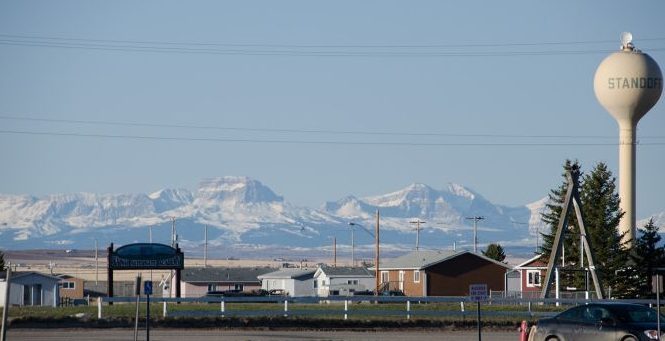A First Nation in southern Alberta had 14 confirmed cases of COVID-19, as of May 20, nine of which were considered active and five cases that had recovered.

The Blood Tribe Department of Health expanded COVID-19 testing for Blood Tribe on and off-reserve members Thursday and Friday, including drive-up testing options.
Testing is available to anyone, with or without symptoms.
As of May 14, there were seven cases confirmed on the First Nation, “with some limited spread in the impacted households,” according to a joint statement from Chief Roy Rox and Dr. Chris Sarin, the district medical officer of health.
Blood Tribe confirmed more cases on Sunday, according to a statement on its website. As of May 17, there were nine active cases and three recovered cases.
Pam Blood, a spokesperson for the community, said the Blood Tribe Department of Health and community health are handling all the testing, contact tracing and have been offering mobile testing units as well to elders and members of the community without access to vehicles.

There is an isolation clinical unit set up in Cardston to ensure people who are waiting for test results or who have tested positive are “isolating in a proper venue,” Blood said.

“Indigenous Services Canada – Alberta region medical officers of health and communicable disease control teams are working closely with the Blood Tribe department of health to mitigate further spread of the virus by implementing a number of public health measures,” the May 14 joint statement from Chief Rox and Dr. Sarin reads.
“We are working collaboratively to ensure individuals self-isolate as appropriate. Blood Tribe has prepared for this scenario and processes are in place and are being implemented to limit further spread of COVID-19.”
The message also reiterated the importance of members taking health precautions, like frequent hand washing and physical distancing.
“Initial contact tracing has shown some evidence of extensive social interactions among individuals who have tested positive for the COVID-19. While none of these individuals currently have severe cases of the disease, there is a potential for wider community spread should these individuals have continued social interactions.
“With this in mind, we want to reiterate the importance of social distancing, limiting social gatherings and, when possible, staying at home.”
Blood told Global News that the health department has been proactive, really pushing out messages of good hygiene and physical distancing. The state of emergency helped stress the urgency of the situation, she said.
About 5,000 people live on the First Nation, Blood said. It’s located southwest of Lethbridge.
Indigenous Services Canada received notification of the first confirmed case on the Blood First Nation on April 28. The federal department has been “monitoring the situation closely” and “working with Blood Tribe community health staff to initiate contact tracing and isolation of affected individuals,” Rola Tfaili, spokesperson for Indigenous Services Canada, told Global News on Friday.
“Blood Tribe has developed a comprehensive pandemic response plan that includes an approach to support isolation.
“In order to facilitate isolation of COVID-19-affected individuals who are unable to isolate in their own homes, the Blood Tribe Department of Health has developed a response plan to support community members,” Tfaili said.
Other steps being taken include case management, contact tracing, enhanced assessment and testing, as well as reporting measures in alignment with provincial public health guidelines.
The federal government’s nursing teams can provide support if needed, but the department said the First Nation has not requested assistance at this time.
- B.C. to ban drug use in all public places in major overhaul of decriminalization
- 3 women diagnosed with HIV after ‘vampire facials’ at unlicensed U.S. spa
- Solar eclipse eye damage: More than 160 cases reported in Ontario, Quebec
- ‘Super lice’ are becoming more resistant to chemical shampoos. What to use instead





Comments